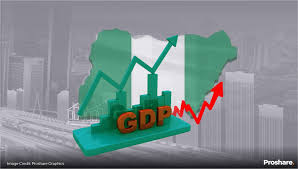Nigeria’s Rebased GDP Hits ₦373 Trillion—Now Africa’s 4th Largest Economy
Nigeria’s Rebased GDP Hits ₦373 Trillion—Now Africa’s 4th Largest Economy
Nigeria’s economic size has officially expanded to ₦372.82 trillion, following a long-awaited rebasing of the country’s Gross Domestic Product (GDP) by the National Bureau of Statistics (NBS)—but the numbers tell a mixed story.
According to the new data, Nigeria’s nominal GDP now translates to about $145.3 billion at the current exchange rate. While that’s a notable rise from the $188.27 billion figure based on the 2010 base year and outdated computation models, it still places Nigeria as the 4th largest economy in Africa, trailing behind South Africa ($410.34bn), Egypt ($347.34bn), and Algeria ($268.89bn).
This outcome disappointed many observers who had hoped that rebasing—now using 2019 as the base year—would help Nigeria regain its top spot. Instead, the data confirms what analysts had feared: naira depreciation continues to undermine the country’s global economic standing.
A New Look at an Evolving Economy
The NBS released concurrent GDP data for six years (2019–2024), offering a fresh lens into Nigeria’s economic trajectory. In nominal terms, the country’s output jumped from ₦205.09 trillion in 2019 to ₦372.82 trillion in 2023, marking an 82% compound increase. The strongest leap came in 2023 with a 17.81% nominal growth.
In real terms, GDP growth rebounded from the pandemic-induced contraction of -6.96% in 2020, rising to 0.95% in 2021, 4.32% in 2022, 3.04% in 2023, and 3.38% projected for 2024.
The rebasing—only the second in the past decade—brought a 41.7% upward revision in nominal GDP, although still less dramatic than the 59.7% revision recorded during the 2014 rebasing exercise.
Tech, Real Estate, and Services Drive Growth
The revised figures highlight a major shift in the structure of Nigeria’s economy. Information and communication technology (ICT), real estate, digital services, and the creative industry have gained greater prominence, surpassing traditional sectors like oil.
Notably, real estate has now emerged as the third-largest contributor to GDP, overtaking crude oil. Similarly, agriculture and services now command a larger share of economic activity, signaling a slow but ongoing diversification.
Dr. Muda Yusuf, CEO of the Centre for the Promotion of Private Enterprise (CPPE), welcomed the update, calling it “a necessary correction” that offers policymakers better insight.
“The rebasing shows that Nigeria’s economy is more diversified than previously reported. It’s an important step for accurate planning and investment decisions,” Yusuf said.
A Paper Boost or Real Progress?
While the revised numbers may boost fiscal optics—such as lowering Nigeria’s debt-to-GDP ratio on paper—experts caution against over-celebration.
Amaechi Egbo, an independent economic analyst, warned that improved figures don’t necessarily translate into improved living conditions.
“GDP rebasing is a technical recalibration, not a magic wand. Without inclusive growth, structural reforms, and investment in infrastructure, it’s just cosmetic,” he noted.
Egbo also argued that while the new data may attract foreign investment, especially in tech and non-oil sectors, the real challenge lies in tackling inflation, unemployment, and Nigeria’s heavy reliance on oil exports.
The Path Forward
The rebasing offers Nigeria a rare opportunity to reframe its economic story—from a petroleum-dependent nation to a more diversified, service-driven economy. But unlocking the full benefits will depend on policy credibility, institutional reforms, and private sector empowerment.
As the dust settles on the rebased numbers, one thing is clear: the Nigerian economy is larger and more complex than old metrics showed. But bigger doesn’t mean better—unless it leads to real, inclusive, and sustainable development.
By Haruna Yakubu Haruna



















